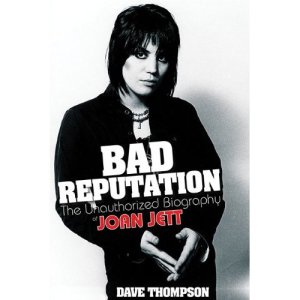To trace the trajectory of singer-songwriter-actress Jett’s rocket rise to fame, Rolling Stone contributor Thompson begins with her 1958 birth as Joan Larkin in Pennsylvania, followed by her family’s move to L.A., enabling her at age 16 to dig the glam rock scene at Rodney Bingenheimer’s English Disco. Absorbing Suzi Quatro’s look and style, Jett was 17 when she launched her career with the Runaways, “the first all-female band to play high-energy rock ’n’ roll.” They encountered hostility and sexist taunts, but toured internationally until “personal differences” split the band apart in 1979. Jett reinvented herself, holding auditions for the Blackhearts: “I want guys in the band—I just love the Runaways too much to do another girl band.” When major record labels rejected the new group, they formed Blackheart Records and sold direct to fans. Success came in 1982 when “I Love Rock ’n’ Roll” climbed to Billboard’s #1 spot, prompting her comment, “The Blackhearts were this punk garage band that nobody would even deal with; then, all of a sudden, we have this #1 song and we’re mainstream. It’s all perception. We didn’t change a thing.” Thompson’s narrative moves at a fast clip, highlighting producers, band members, fans, films, rival groups, albums, and videos, as he details how Jett fueled a high-octane frenzy with her confidence, drive, and blistering performances. (Oct. 11)
A Runaway’s success
If the phrase “unauthorised biography” largely conjures up images of a superficial cut’n’paste hack job, then Dave Thompson’s excellent study of Joan Jett is at the other end of the spectrum: the labour of love. Part of Jett’s story is now pretty well-known, thanks to the recent Runaways movie, but this book is a reminder of the fact that, even when The Runaways and their sporadically excellent discography was all but forgotten, Joan Jett herself was, if not a household name, at least an established artist.
Since the dissolution of the band, Jett’s career has been one of highs and lows. As Bad Reputation documents, her consistency means that, when fashion is receptive to a punk-ish vision of rock’n’roll, without its sometimes overblown aspects, Joan Jett tends to do well; when artificiality or stadium pomposity are in vogue, she suffers accordingly.
If there’s a down side to Thompson’s stylish, passionate book it’s perhaps that he tends to exaggerate Jett’s importance. On the other hand, his enthusiasm is such that he may just sway you.




A new guitarist was recruited. It was one of the Mia Zapata benefit shows, at La Luna in Portland, that introduced the latest member of the Blackhearts to the audience, bassist Sean Ray Koos. Born in Hawthorne, California, on March 13, 1961, the son of a Bourbon Street jazz trumpeter, Koos was in the audience one evening when Tony Bruno gave one of his solo shows. The two knew one another, and when Koos went up to say hello, Bruno asked if he was interested in auditioning for the band. “‘It’s in two days.’ He gave me a tape that night and I said, ‘Yeah, I’m into it’.”
He knew Jett’s music, of course – he’d been a fan since the first time he saw them opening for the Who a decade before. “Even back then, I was going, ‘God, if I could just be in a band like that’….” Now he was, and reaping the immediate benefits too. The first track he recorded with the Blackhearts, at A&M Studios in Los Angeles in December 1995, was a version of the old J Geils’ Band hit “Love Stinks,” for inclusion in the movie soundtrack Mr Wrong. And the second was the theme to television’s Mary Tyler Moore show, “Love Is All Around,” commissioned from Jett by the Women’s College Basketball organization, as a theme for the upcoming Sweet Sixteen championship.”
There were other projects percolating, too. A call from the music supervisor of the upcoming movie Tank Girl gave Jett the opportunity to voice the Cole Porter song “Let’s Do It,” with the LA punk veterans Bad Religion alongside her and, afterwards, Laguna told the fan club that “it came out a lot better than anyone had dreamed. [But] when we got done with it, Bad Religion’s manager decided he didn’t want it to come out as a single. He never thought it could be that good. We like the guys from Bad Religion, but they wanted us to put another voice on it, so we called our friend, Paul Westerberg. He was really into it and did it. So the guys in Bad Religion are playing the backing track with Thommy Price… and Tony Bruno playing bass. So you have Bad Religion, who also did all the background vocals, Jett, the Blackhearts and Paul Westerberg on one track that Cole Porter wrote. That probably won’t ever happen again.”
For the most part, however, the Blackhearts simply got on with their job, headlining venues that crammed in up to ten thousand kids in at a time; hitting the summertime festivals around the US; throwing a sharp version of “Real Wild Child” onto an Iggy Pop tribute album… “I had a real hard-on for ‘I Wanna Be Your Dog’,” Jett recalled. “But I don’t know….” “Real Wild Child,” the mid-1980s rocker that gave Iggy his first ever hit single, had been in the Blackhearts’ live set for a while, “and it was a lot of fun,” she said. “You know – why not do something different?”
The accompanying video was just as exciting. With Jett nursing a shoulder she had injured the previous evening in a bicycling accident, but biting back the pain to celebrate the appearance in the shoot of Joey Ramone, it also allowed Jett to unveil her new hairstyle to the cameras, short, blonde and spiky replacing the familiar lush darkness. It seemed somehow appropriate.
Meanwhile, what about that new Joan Jett and the Blackhearts album? Almost two years had elapsed since it was first formulated, at Armoury Studios in Vancouver, and it was, apparently, still gestating.
But it was also snared within a succession of bear traps, only the most easily resolved of which had anything to do with Jett and the band.
The Bob Rock sessions had been mothballed after Rock became involved in the latest Metallica project. Of course it drew him away from the Blackhearts and, while there were initially plans for him to simply pick up where he left off, once Metallica was complete, Jett shrugged, “we couldn’t wait anymore. It sort of slowed us down a bit, but now we’re back in the flow.”
Now the band was working with Ted Templeman, a veteran whose resume stretched back to the Doobie Brothers and Van Morrison in 1971, then moved on to the likes of Van Halen, Aerosmith, the Bullet Boys, Damn Yankees and Cheap Trick.
“Bob’s a great guy,” Jett explained as the Templeman sessions got underway. “He’s a very good producer and a really nice guy, but for some reason things didn’t sound right. I don’t think it had to do necessarily with him; it’s just everything sounded a bit soft. It just wasn’t coming across the way we wanted it to sound. It didn’t sound raw or aggressive enough, so we decided to change producers.”
She reeled off her songwriting collaborators. Jim Valance was back, and so was Kathleen Hanna. She had laid down some favorite covers and was looking forward to the album’s scheduled release date in September 1997. “I’m excited about that.”
In fact, she would have a lot more time than she thought. Having already scrapped the Bob Rock sessions, the Templeman recordings, too, seemed doomed to remain archived. September 1997 came and went with no sign of the album; in its place, Blackheart Records released a hits collection, Fit To Be Tied, with bonus track-stuffed reissues forBad Reputation and I Love Rock’n’Roll, to follow. And eighteen months later, Jett was still awaiting a berth on the new release sheets, and growing increasingly frustrated by the delays.
Talking with the fan club that summer of 1999, Kenny Laguna sighed, “every time Warner Brothers goes through a change of management, they’re all excited about Joan, and they stick their nose in it, and we’re still trying to cooperate with these guys…they’ve got a really good guy in there now, so we’ll see how it is. They’re talking a good game, so let’s see if they walk it like they talk it”
There were, he said, some twenty-five songs in the can, drawn from both the Rock and the Templeman sessions, and the album would certainly be created from that stockpile. In the meantime, the gap would be plugged with yet another compilation.
Fetish, Laguna declared, would draw together “the very best songs that are sexually adventurous, that Joan’s done.” “Handyman,” “Black Leather,” “The French Song,” “Starfucker” and “Do You Wanna Touch Me” were all rounded up, together with a thunderously explicit “XXX” version of “Fetish” – XXX, because there really can’t be many songs where the opening verse concludes with a reflection of tying up your lover ”while I fuck your head.” Up there with the Headcoatees’ tantalizing revision of the old ballad “Come Into My Life,” rewired as “Come Into My Mouth,” “Fetish” is one of those songs that can liven up the dourest party, and Laguna had no doubt that the full CD would have a similar effect. “It’s going to be a really cool album, and it flows well.”
Fetish was, he said, an idea that they’d been batting around for a while, and there is little doubt that it was the protracted drama over the “real” new album that pushed them to release what amounted to another compilation.
But that wasn’t the only reason. Themed compilation albums were an unusual idea, and it was one that Laguna wanted to act upon before anybody else came up with the same notion – particularly as there was also a sense that the Blackhearts had inadvertently passed some very good ideas onto other Warners acts in the past, and they had no intention of that happening again.
“It was a unique idea and I just had a feeling that somebody was going to steal the idea. It had been sitting around too long, people were talking about it, we’d been getting hundreds of letters about the song live, we had it on the internet for a while, and it was getting a reaction, we were getting a lot of requests from clubs all over the country for copies of it. And I thought, you know what, we sit around long enough, somebody’s going to copy this song, copy the idea. So that’s why we did it.”
Fetish would be released in June 1999, five long years after Pure and Simple, and its X-rated subject matter certainly drew in a few curious ears that might not otherwise have listened to a Joan Jett album. Which certainly made a pleasant change from the other Jett-related scuttlebutt that was hanging from the grapevine that season… the imminent Runaways reunion.


I have questions about Joan Jett.